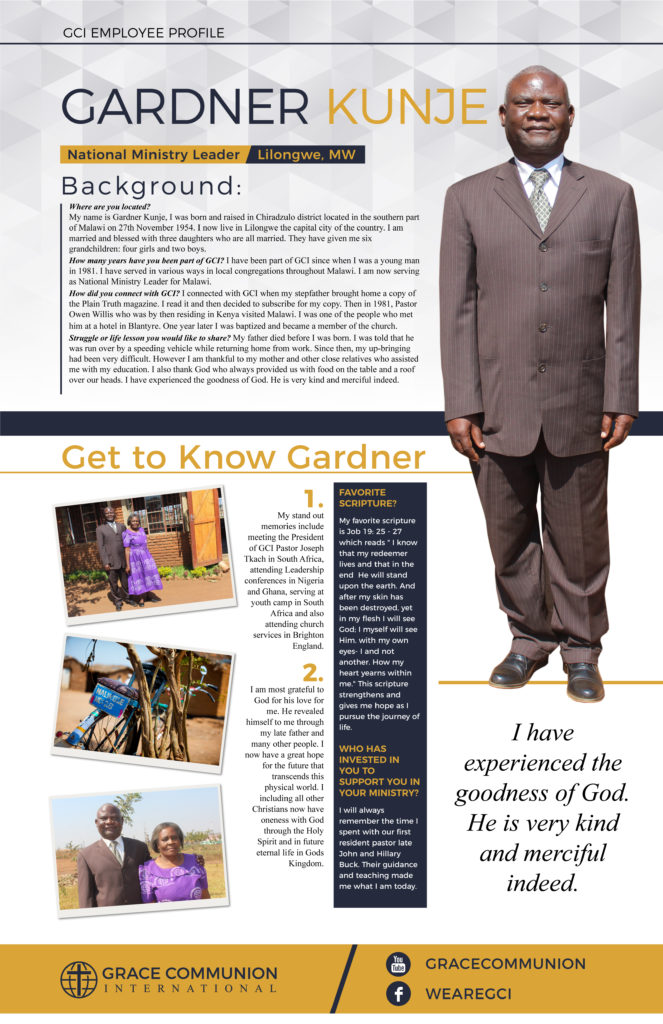Click on the image below to meet Gardner Kunje, GCI’s National Ministry Leader in the African nation of Malawi.
Year: 2018
Church, Kingdom & Government part 2
Here is part two of The Church, the Kingdom and Human Government—a three-part essay from Grace Communion Seminary President Gary Deddo (click here for part 1, and here for part 3).
The church is called to witness
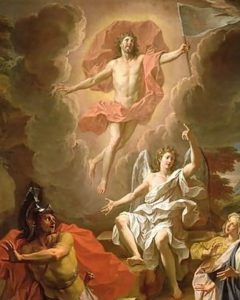
(public domain via Wikimedia Commons)
As noted in part 1, there is an “already-but-not-yet” aspect of the kingdom of God. Though it has already broken into the world, its fullness is not yet seen. Though Jesus is now Lord of all, it does not yet appear that all things are subject to his rule and reign (Heb. 2:8, ESV). Though Christ’s victory is complete, it is not yet fully apparent—it has yet to be fully uncovered (revealed).[1]
As Christians, our calling (vocation) is to witness to the reality of Christ and his already-but-not-yet rule and reign (i.e., his kingdom). We provide that witness first by living in a worship relationship with God through the gracious mediation of Jesus and the ministry of the Holy Spirit, all under the authority of Scripture (Eph. 2:20). We then gather to proclaim the fact that Jesus is King of kings and that his rule and reign is assuredly coming in all its fullness (Acts 1:4-9). In this way, the church becomes a beacon of the hope that will be realized when Jesus returns to earth at the end of this present age (2 Tim. 4:1).[2] Concerning this witness provided by the church, note these three things:
- The witness of the church is partial, temporary and provisional (more on that below).
- It serves as a sign (parable or pointer) of the rule and reign of Jesus (Acts 5:12).
- It points forward to the consummation that is yet to come when Jesus returns (Act 2:22). In that way, the witness of the church is like the earthly ministry of Jesus, which did not set up the fullness of the kingdom. Instead, Jesus pointed forward to a future coming of his kingdom.
Through the earthly ministry of Jesus (including his death, resurrection and ascension), the kingdom was inaugurated, though it has yet to be fully consummated (realized). Because that consummation is yet to come, we wait with expectancy, hope and patience (Rom. 8:25). However, our waiting is not passive, for we are called to the mission of witness—the ministry of declaring Jesus Christ and his coming kingdom, so that others may come in and participate now in his church.
Our mission as the church is to declare the kingdom, not set it up or substitute for it. Nowhere does the New Testament teach that the church’s witness will gradually and inevitably turn into the kingdom. Were that the case, the church would cease being a witness (a sign) and turn into the reality to which the sign points. That the church’s witness will expand in the world is implied in Scripture, even assumed. However, that expansion should not be confused with the full manifestation of the kingdom and the coming of the new heavens and earth.
Don’t confuse the church and the kingdom
It is a mistake to confuse the church and the kingdom. Such confusion sets up unfounded expectations of the church and leads to disillusionment and bitterness concerning either the failure of the church or, even worse, the failure of God to accomplish through the church what we wrongly expect of the church in this current “evil age” (Gal. 1:4; 1 John 2:8).
Scripture teaches that, when he returns, Jesus will bring the kingdom in all its fullness to earth. In the present age, prior to the return of Jesus, God grants to the church the privilege of being a sign that points to the coming kingdom. The fact is that the church fulfills this mission of witness imperfectly. As Jesus indicated in the parable of the wheat and tares (Matt. 13:25-30, KJV), his church will not be perfectly pure in this age. The book of Acts and the Epistles, along with the record of church history, bear witness to this fact. The imperfection of the church contrasts with the perfection of the kingdom, in which there will be no mixture of good (wheat) and evil (tares). Evil will have no place in the kingdom of God. Indeed, evil has no future. This reality is secured by the resurrection and ascension of Jesus, along with Jesus’ promise that he will return with power to put an end to all evil and to vanquish death and all suffering (Rev. 12:10).
The nature of the church’s witness to the kingdom
As a sign (embodiment or parable) of the kingdom of God in the present fallen world, the church’s witness will always be partial, temporary and provisional:
- The church’s witness is partial. It is unable to display the full range and depth of what God’s kingdom will be like. What the church does and says will only indicate a limited part of what the kingdom is about. The church will not be able to point to every dimension of the kingdom equally well. The witness of the church, as important as it is, will not bring about the completeness of the kingdom. Instead, it points beyond itself to the fullness yet to come, bringing forth anticipation and hope in the hearts of those who, in faith, look forward to the coming kingdom.
- The church’s witness is temporary. As the church embodies signs of the kingdom, those signs will often only last a little while then wear out, become degraded, and sometimes even corrupted. As beneficial as this witness is, it cannot be sustained indefinitely.[3] New forms of witness will always be needed as the old ones are forgotten, fall away or become no longer viable or relevant.
- The church’s witness is provisional. It is not the reality, though it is a sign pointing to the reality—the coming kingdom of God. In that way the church’s witness engenders hope that exceeds what the church can accomplish here and now before Christ returns and evil is vanquished as all things are made new.
Though partial, temporary and provisional, the church’s witness is vital. In obedience to God’s commands, the church bears witness to its King and his coming kingdom, knowing that it is Jesus Christ who has promised that the kingdom of God will come. Sadly, the church has often turned aside from this calling, failing to offer the world partial signs of the kingdom’s coming reality, thus failing to be a provisional beacon of hope to the world. It has settled for becoming much like the surrounding culture. Instead of witnessing to the kingdom, the church has, at times, tried to make itself the kingdom—it has tried in vain to establish the fullness of the kingdom on earth now. In making that mistake, the church has assumed for itself a task that is reserved for Christ, becoming in its own eyes an end in itself, thus falling into the sin of idolatry and often compromising itself in the use of worldly power to achieve an impossible ideal.
The kingdom is not human government
We have seen that the church is not the kingdom. Now we need to see that human government is not the kingdom. Just as the church does not evolve into the kingdom (despite misguided attempts by a few church leaders to bring about that evolution), human government cannot evolve into the kingdom (again, despite attempts in that direction). Scripture makes it clear that God’s kingdom is not a human kingdom.
Human government does have an important, though limited, purpose in God providence. This is seen in Jesus’ teaching regarding distinguishing between what belongs to Caesar and what belongs to God (Mark 12:17). It also is seen in the way the apostles interacted with the Roman government of their day (e.g., Acts 4:19 and Rom. 13:1-7). In this age, human government has a limited purpose defined by God and has been assigned limited authority derived from God. Many don’t recognize that purpose (with its limitations) but the church must.
By God’s decree, the purpose of human government is to maintain fundamental social order and human justice, seeking the common good within the limits defined by God. No human government can rightly regard itself as absolute. Rather, all exist under an absolute that transcends human rule and reign. No human government has absolute rights over any human being, since all human beings belong to God. Humans are creatures of God, not of any human ruler.
It’s also important to understand that human government is limited in the good it can accomplish. Why? Because humans are unable to banish all evil and to prevent evil’s perpetual temptations. Human government cannot heal and transform the human soul, it cannot reconcile alienated human beings, and it cannot undo or redirect the past. No human government can make all things right—they are unable to renew and restore all things, including the past. Therefore, the church must not expect human government to solve all of humanity’s problems. No human government can turn itself into or otherwise bring about the kingdom of God by being the perfect, ideal government on earth before Jesus returns.
Nevertheless, the church should expect some good to come from human government. Keeping in mind the limited responsibility that God gives it, the church should remind civil leaders of the range of authority they should exercise for the common good. The church should also warn leaders to not neglect the responsibilities that go with their authority, and it should speak out if government exceeds the boundaries of those God-given responsibilities, especially when acting as if they have absolute authority and are answerable to no higher authority than themselves—whether that authority be God or, if not God, a moral standard which all governments ought to abide by.
Though human governments often are unaware of their God-given purpose and limited range of responsibilities, that lack of awareness does not eliminate the truth. One of the church’s tasks is to bear witness to human government concerning this truth. That is what we find the church doing in the New Testament (e.g., Acts and Romans). In bearing witness, the church must be realistic in its expectations of human government. In this present evil age, no government will be perfect, and none will establish the ideal human community. All human governments, like the citizens they are called to serve, are endangered by evil. They rise and fall, they come and go.
No human governments (together or individually) will ever be able to bring about the kingdom of God. Christians should not believe that human governments can do that, thereby confusing human government with the kingdom of God. Only God can (or should) be worshipped. Worship of any human leader or government is idolatry. Forgetting this was the huge mistake made by much of the church in Germany during the rise of the Nazis in the 1930s and 40s. In that dark time, most of the church in Germany surrendered itself to Hitler, believing that the greater good of God’s kingdom on earth would thereby be created. This happened in large part because these Christians mistakenly believed that Hitler could establish God’s ideal on earth—the kingdom of God. Because they believed that, they also believed that the great end the envisioned justified any means used to bring it about. They were terribly mistaken.
The reverse is also true. The coming of the kingdom of God will not amount to the installation by God of a perfect, ideal human government. God will not raise up a human-led government to serve as his kingdom on earth. Rather, God will reign through the Spirit fully manifested in every human life, and so lived out in gladness and freedom in and through all their relationships and activities. God himself will be their light. God himself will banish evil. God will end all suffering and resolve all regrets of the sinful past. God will reconcile all things and right all wrongs. In God’s kingdom, righteousness (right relationships) will not be legally imposed or socially enforced. Rather, righteousness will flow unimpeded from God through human hearts and minds and (figuratively) out through their hands and feet.
In the kingdom of God, there will be no pride, arrogance or temptation to self-justification. All barriers in the way of fully receiving all from God and passing it on to others will be torn down. The kingdom will be fully manifested, not externally, but from within and among all those who come under God’s rule and reign—all who enter God’s kingdom when invited, leaving behind all other kingdoms, all other loyalties, all other priorities. Citizens of God’s kingdom will be the true children of God who will, for the first time, experience true freedom to the full.
The church should not seek to substitute for human government
The church must not try to turn itself into an earthly government in this time-between-the-times. It also must not try to build the kingdom on earth by human means, through the agency of human government. The church must never seek to displace and take over the vocation of human government. The church is not going to bring in the kingdom, and it is not going to become God’s ideal form of earthly, humanly mediated government.
Neither the church nor the kingdom amounts to the installation of human government. In the kingdom of God, Jesus himself, by the Spirit, will rule and reign in human minds and hearts in a new heaven and earth. It is this renewal of all things that will constitute the coming of the kingdom. Though Jesus will not turn his kingdom rule over to its human citizens, those citizens will share (participate) in his rule and reign, and do so perfectly, by his word and Spirit. At that time (and not before) it will be clearly manifested that Jesus has indeed “overcome the world” (John 16:33). We will reign under and with him, sharing in his kingly victory.
In the meantime, awaiting the coming of the kingdom, the church is called to bear witness to the world, including its various human governments, concerning the Lordship of Jesus Christ and the coming kingdom of God (Col. 2:10; Eph 3:9-11). It is called to do so by being an embodied sign of the hope of the coming kingdom. That hope will not be presented as involving the development of a human government ruling and reigning perfectly. Though the church will bear witness to the limited but good purpose for human government (and speak out when governments fail in that purpose[4]), it will not confuse human government with the kingdom or with the church.
The church, in its witness, will support and respect human government and contribute to its best practices. However, the church, when needed, will also critically engage government when it exceeds its God-given, limited boundaries. In that witness, the church must never abandon its God-given, Christ-founded, Spirit-empowered vocation of worship and witness by which it serves as a beacon of hope in this present evil age. Lord, give us courage to be your witnesses in this world!
Endnotes
[1] In Greek, the first word and title of the book of Revelation is apokalypsis (from which we get the word apocalypse). It means to uncover or reveal.
[2] For the clear understanding that the kingdom of God is the future hope of God’s people, see also: Matt. 13:41-43; 24: 14; 26:29; Luke 19:11; 22:16-18; John 18:36; 1 Cor. 15:24; 2 Tim. 4:18; Rev. 11:15.
[3] Even Jesus’ raising of the dead was not permanent. The persons (e.g., Lazarus) that Jesus raised eventually died again. These resurrections (really resuscitations) were signs, and Jesus did not raise everyone from the dead during his earthly incarnate ministry. Jesus’ resurrection, however, is permanent. His death is once (and for all). It is the reality to which the signs point.
[4] See the Barmen Declaration issued by the underground Confessing Church in Germany at the time of the Third Reich of Hitler and the Nazis. That document stands as a modern witness against the abuses of governmental authority and the acquiescence of any church to that abuse, as in the case of the so-called “German Christians” of the Reich Church of the time.
Storm reports
We have been praying for the safety of GCI members and others affected by Hurricane Florence in the Eastern United States, and by Super Typhoon Mangkhut in the Philippines (now affecting China). We have not received a report from the Philippines, though we know of significant damage from flooding and wind. Concerning the impact of Florence, U.S. Regional Pastor Paul David Kurts sent this report:
Many of our GCI brothers and sisters have inquired about our safety here in the Carolinas, reassuring us that they are praying and stand ready to help in our recovery. It has warmed my heart to see the genuine love and concern for all who have been impacted by this catastrophic event. The current death toll in North and South Carolina now exceeds 30 people. This number will likely grow as flood waters recede and more bodies are recovered. The biggest challenge ahead will be dealing with flood damage and loss of electrical power. Hundreds of thousands of people are still without power and have been displaced from their homes. By God’s grace, GCI members here in Hickory, North Carolina dodged a bullet and didn’t get too much wind or rain. This enabled several in our congregation to offer their homes to GCI members displaced from their homes in other areas, though none of us were actually taken up on the offer. I’ve communicated with the pastors in this part of our region and I’m thankful to be able to report that none of our members were injured. Thank you for your prayers and offers of support.
Death of GCI elder
We were saddened to learn of the recent death of Karen (Jones) Quinn, who served as an assistant pastor in GCI’s Houston, TX, congregation.

Born in 1944, in Salem, OH, Karen grew up in the nearby town of Columbiana. Even from an early age she recognized the importance of community involvement, often leading clubs and activities. In high school, Karen was a majorette and enjoyed playing basketball. In her college years, she sang in the college chorale and enjoyed traveling for performances. She earned her Bachelor of Arts degree in Theology from Ambassador College in 1966 and always valued the friendships she made in college.
It was during her college years that Karen met her future husband Terry Quinn at a summer camp in Orr, MN, where Karen was a counselor. Terry and Karen married on August 12, 1966. One year later, their daughter Susan was born.. In 1982 the family moved to the Houston area, where Karen quickly became a fixture in the community of Katy, TX. Karen loved travel and was a successful businesswoman. She founded Quinn Travel Services in 1990, and managed it for nearly 30 years.
Karen was ordained an Elder in Grace Communion International and served in ordained ministry in the Houston area for several years, giving sermons and leading Bible studies. She chaired the local church Advisory Council for more than 15 years. Her faith was one of her defining features. She loved God and put him first in her life.
Karen passed away on August 21, 2018 at home. She fought a brave battle against cancer during the last two years of her life. She is survived by her husband Terry, their daughter Susan, two grandchildren, and her brother Darryl. It was Karen’s desire to be laid to rest in the Quinn family plot in Leesport, PA. She will be greatly missed.
Cards may be sent to:
Terry Quinn
1503 Hannington Dr
Katy, TX 77450
This is my story
“From the President” this week is by GCI Vice President, Greg Williams.
Dear Brothers and Sisters,

My father, Dean Williams, provided my first link to GCI (formerly WCG). While serving as a lay pastor in a small Advent Christian church in Dana, NC, dad began studying WCG literature. Then in 1974, he contracted Ankylosing Spondylitis, a crippling form of rheumatoid arthritis that caused his vertebrae to begin fusing, resulting in terrible pain. As a result, he was bedridden for a year. He used that time to study WCG’s 58-lesson Ambassador College Bible Correspondence Course.

Though lacking formal Bible training, my dad had always been a dedicated student of the Bible. So, after completing the Correspondence Course, he had many questions. In 1975, he contacted WCG headquarters in Pasadena, CA, and was put in contact with Hugh Wilson, the WCG pastor nearest our home. When the two met, my dad wanted to discuss the book of Romans. My dad’s contention was that in Romans, grace wins out over law. Pastor Wilson countered with WCG’s belief that God’s law was still in force since the church lives in the time between the old and new covenants (with the new not fully in force until Jesus returns).
Acquiescing to Hugh’s argument, dad led my family in leaving the Christian Advent church to become Sabbath-keeping WCG members. Every Saturday we would travel 30 miles to attend WCG church services in Asheville, NC. This meant that I was taken out of the normal routine of a 17-year-old who had been active in school life as a three-sport athlete. Instead, I became an active participant in WCG’s Youth Opportunities United (YOU) activities, driving across state lines to attend family weekends in places I had never visited before. I excelled in YOU track and field competitions, going from regional to tri-regional events, and then to the 1978 YOU national track meet in Pasadena, CA. I was then invited to attend a National Youth Leadership weekend in Pasadena. These activities solidified my desire to attend Ambassador College. There I met a co-ed named Susan Lang. We attended Ambassador from 1979 to 1983, and were married in 1984.
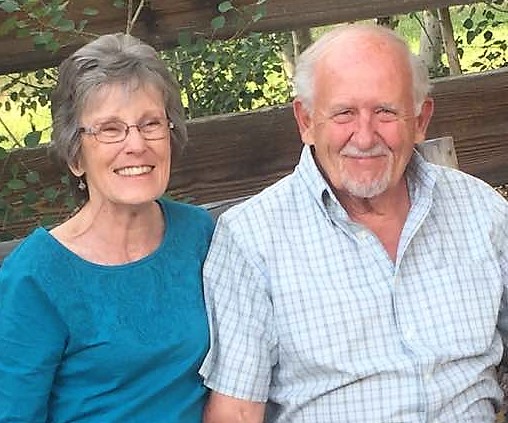
In October of 1986 I was ordained an elder in WCG and by the summer of 1987, Susan and I, with our newborn twins Glenn and Garrett, were on our way to Denver, CO, where I served as an Associate Pastor. There we crossed paths again with Hugh Wilson who was now the pastor of WCG’s congregation in nearby Fort Collins. Hugh and his wife Linda went above and beyond in making us (a couple with newborn twins!) feel accepted into ministry. We are still grateful for the wonderful way they treated us.
Fast-forwarding now in the story, by 1996 WCG had fully embraced the biblical teaching that the new covenant was fully in force with Jesus’ death, resurrection and ascension. This means that the church is under grace, not law. That year I once again crossed paths with Hugh Wilson. Being a likeable and humble man, he said, “Greg, I guess your dad won that argument we had about the book of Romans!” We had a good chuckle, and when I shared the story with my dad, his heart was warmed.
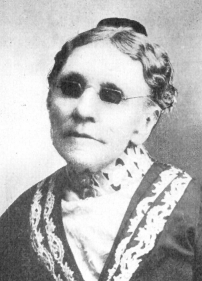
My dad was a huge admirer of Fanny Crosby. Though becoming blind shortly following birth, she is said to have composed over 8,000 hymns! Fanny’s lyrics testify to a believer who, despite physical blindness, saw Jesus with clear, strong eyes of faith. Her hymn, “Blessed Assurance,” was my dad’s favorite. Its first line proclaims a great truth: “Blessed assurance Jesus is mine!” The chorus then adds, “This is my story, this is my song, praising my Savior all the day long.”
My dad’s journey, from grace to law, then back to grace, is also my story—one with a conclusion that is the testimony of all believers: Jesus is mine, and I am his.
Praising my Savior, all the day long,
Greg Williams
Deddos’ new grandson
Grace Communion Seminary President Gary Deddo and his wife Cathy are celebrating the birth of Augustine James Deddo, their fourth grandchild, born to the Deddos’ son Greg Deddo and his wife Janelle on August 27. Gary reports that Augustine, though three weeks premature, “is healthy and ready to go—although he sleeps a lot. Mom and Dad are doing well.” Gary also noted that “being grandparents to a grandson living nearby is a bit different from being grandparents at a distance.” Their other three grandsons live 675 miles away. Gary said, “We’re very grateful to the Lord for a healthy grandbaby and the chance to be more regularly involved in helping out.” Here is a picture of Augustine with his father Greg:
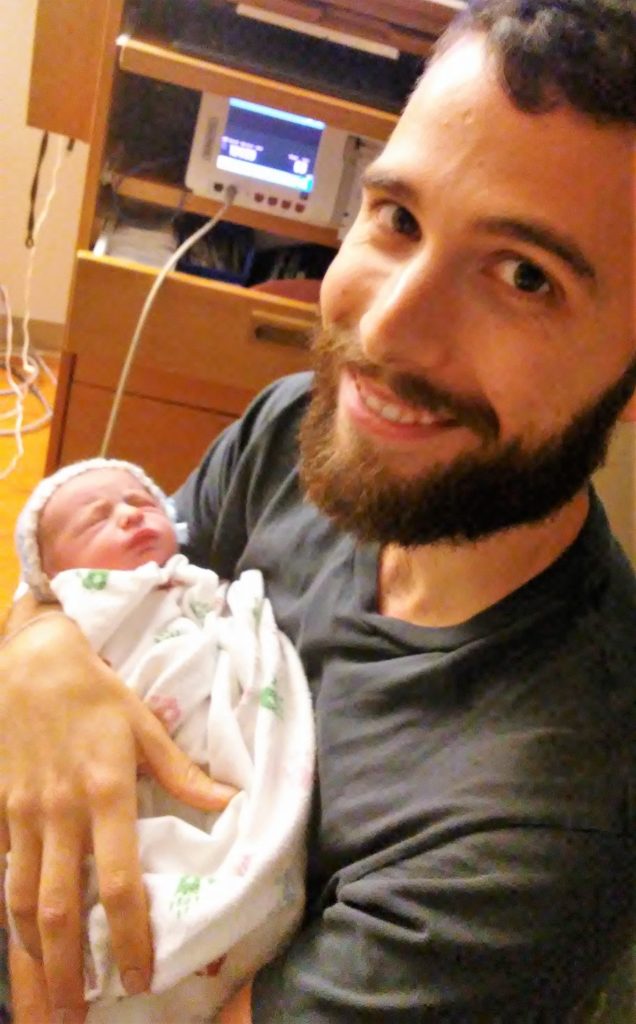
September Equipper
Here are links to the articles in the recently published September issue of GCI Equipper.
From Greg: Let’s Be Sponsor-Mentors
Greg Williams addresses a vital step in our journey toward Healthy Church-–providing sponsor-mentors for new, younger leaders.

Healthy Church: R.E.A.L. Teams (part 1)
Here is an infographic that looks at team-based ministry—a key aspect of church health, and a key component of the faith, hope and love venues.
Healthy Church: Connection Card
Here is an infographic that looks at the use of a connection card to build relationships (the love venue) with the people who visit your church.
Worldview Conversion: The Role of the Church
Charles Fleming looks at the important role church leaders have in facilitating worldview conversion—a key aspect of church health.
Worldview Conversion: Whole-Life Discipleship
Gary Deddo explores the vital role whole-life discipleship plays in facilitating worldview conversion.
Prayer Guide: September 2018
Here are GCI-related topics to pray about each day during September.
Kid’s Korner: Loving Our Kids to Life!
Lance McKinnon explores the calling youth and children’s ministers have in helping our kids develop a Christ-centered worldview.
RCL Sermons
Here are sermons for October that sync with the Scripture readings set out in the Revised Common Lectionary:
–October 7, 2018
–October 14, 2018
–October 21, 2018
–October 28, 2018
In case you missed them last month, here are the sermons for September:
–September 2, 2018
–September 9, 2018
–September 16, 2018
–September 23, 2018
–September 30, 2018
GCI pastor retires
Thanks and congratulations to Steve and Mary Ann Brown! Steve recently retired from 40 years of GCI employment, pastoring churches in Michigan, Missouri, West Virginia, Ohio and Florida. Here are pictures of a party in the Browns’ honor, held recently in Bradenton, FL (Mary and Steve are at left in the picture below, left). Four of the couple’s five children joined in the celebration.

Cards may be sent to:
Steve and Mary Brown
4350 Genesee Lane
New Port Richey, FL 34655
Death of GCI pastor
We were saddened to learn of the recent death of Charles Akowuah, GCI pastor and church board member in Ghana, Africa.
Following a few years of ill health, Charles died at home on August 12 at age 77. He is survived by his wife Comfort, their son Richard and four grandchildren.
Charles was baptized in 1970, becoming the first GCI member in Ghana. He and his wife then served as the first administrators of GCI (then WCG) in Ghana. Charles pastored the congregation in Kusami and served on the Board of the church in Ghana for nearly 20 years. In recognition of this meritorious service, the church presented to Charles and his wife a citation in 2017 during the last church convention he attended.
Upon learning of Charles’ passing, David Bedford, one of the pastors who had served in Ghana, wrote this:
It is a sad day for the church in Ghana. Charles played such a large part in the early years of the church in Ghana and continued to do so for many years until his death. He is a great example for anyone who is serving God and his people. It is a great comfort to know about a future resurrection and what a wonderful reunion that will be for all of us. Charles was faithful and hopeful to the end of his life.
Charles’ funeral is scheduled for October 20, 2018.
Church, Kingdom & Government part 1
Here is part one of The Church, the Kingdom and Human Government—a three-part essay from Grace Communion Seminary President Gary Deddo (click here for part 2, and here for part 3).
Introduction

(public domain via Wikimedia Commons)
Scripture declares that the resurrected and ascended Jesus Christ is Lord and Savior of all the cosmos! This singular revelation, coupled with the whole of the Scriptural revelation, sheds light on everything—on all of life and all history (and beyond!). Who Jesus Christ is, what he has done, is doing and will yet do as Creator and Redeemer, has everything to do with everything!
As Christians, we apply this insight to our life together as the body of Christ, the church, and then to the other spheres of life beyond the boundaries of the church. In doing so, we are thinking out of a Christ-centered worldview [1]—a way of seeing all spheres of life in accordance with the mind of Christ. A primary challenge in this is to discern Christ-centered answers to two important questions:
- Since Jesus Christ is Lord and Savior of all, what should the message of the church be to the world outside the church?
- As Christians, how should we live in relationship to the spheres of human life that surround the community of the church?
Properly answering these questions necessitates having a Christ-centered, biblically-informed understanding of the nature, purpose and interrelationships of three key spheres:
- The church of Jesus Christ.
- The kingdom of God.
- Human government outside the church.
How we understand these spheres and their interrelationships shapes how we live in the world as followers of Jesus. Sadly, some have misunderstood what the Bible teaches and, consequently, have become cynical or hopeless noting that neither the church nor any human governments are the ideal. Others have compromised their faithfulness to Jesus and the church, seduced by false hopes and catastrophic fears promulgated by worldly ideologies.
To avoid these pitfalls, it is vital that we think carefully about this topic and not assume that what we read and hear are true. As of yet, a clear consensus within the church concerning how to put all this together has not been achieved. That lack seems to be due to the failure of much teaching to take into full account the triune nature of God, the return of Jesus (bringing about the fullness of the kingdom), the nature of the church, and the nature of human governments. Thus, there has been a failure to account for the purpose and place of each of the three spheres in God’s plan, leading to the blurring of the biblical distinctions between them. This has, in turn, led to the church making these mistakes:
- Losing track of its God-given purposes and proper boundaries.
- Regarding itself as the kingdom (rule and reign) of God, standing within the larger world.
- Setting itself up as the ideal human government, standing over other governments, assuming that the church is the kingdom of God on earth.
- Promoting certain human governments as being the kingdom of God on earth with universal rule over all other human authorities, thus ceding to human government what belongs to God alone.
When these and similar mistakes have been made, the church has lost its saltiness (by which it seasons the world) and its voice (by which it proclaims to the world the true hope of humanity). In this essay, we’ll seek to avoid these mistakes by defining the God-ordained roles for and the interrelations of the church, the kingdom of God, and human government. In doing so we’ll draw on the insights of several theologians who, sharing our incarnational Trinitarian foundations, articulate a theological synthesis of the biblical revelation concerning the topic. Though it can’t address every related issue, we’ll seek in this essay to provide a succinct outline of a Christ-centered, gospel-shaped and biblically-informed way to approach the topic. Let’s begin by addressing a vital point: The church is not the kingdom of God.
The church is not the kingdom
Though not entirely separate, the church and the kingdom of God are not the same, and must not be confused. Since Jesus is Lord of both, believers (members of the church) do belong to the kingdom. However, they cannot participate in the kingdom in the same way they participate in the church, because the fullness of the kingdom is yet to come. In the meantime, the church operates within “the present evil age” (Gal. 1:4). During this “time-between-the-times” (between Jesus’ first and second advents), it does not seem that all things are in subjection to Christ’s lordship (Heb. 2:8). Therefore, the church’s basic orientation to the kingdom is one of expectation and hope, awaiting the coming fullness of the kingdom (Matt. 25: 34; Luke 22:18; James 2:5; 1 Thess. 4:15; 1 Peter 1:3, 13; Titus 2:13).
For now, the church gathers to worship the triune God. These gatherings include those who have been incorporated into the body of Christ by receiving, as a gift, the “down payment” (or “first fruits”) of the Holy Spirit. Believers are “sealed” with the Holy Spirit, who is given to them based on Christ’s finished work. Those indwelt by the Spirit have met the King and are enjoying daily personal fellowship and communion with God through the Spirit. In that way, they are experiencing the first fruits of the coming kingdom, which already has drawn near. They worship God in Spirit and in truth, receiving the fruit of the Spirit into their lives, and serving one another using the gifts the Spirit distributes to the body of Christ as he wills.
The promise made by Jesus of the coming of the Spirit to form and be with the church has come to pass. However, the promise Jesus made regarding the kingdom has largely not come to pass. So, during this present age, the church waits patiently and with great expectation, for Jesus’ bodily return to earth to usher in the kingdom’s fullness. Because Jesus is now bodily absent from earth, his kingdom is yet to come—his rule and reign are yet to be fully manifested here on earth. That fullness is only possible when he will be personally present to reign. Therefore, the church does not, indeed cannot, experience the fullness of Christ’s rule and reign here and now. That is why we pray, as Jesus taught us, “Thy kingdom come” (Matt. 6:10, KJV).
During this age, the church does not yet exemplify the total and final reality of the kingdom of God. Neither Jesus nor his select apostles expected that it would. Rather, the church is being continually sanctified by the ongoing ministry of the Holy Spirit in accordance with Jesus’ high-priestly prayer in John chapter 17. As Jesus noted in the parable of the wheat and tares (Matt. 13:24-30 KJV), the church in this age is far from sharing in the fullness of Christ’s rule and reign. The assembly of the church includes both believers (wheat) and not-yet-believers (tares)—even some tares opposed to Christ. However, the church does provide concrete (albeit imperfect) witness to Jesus, proclaiming the sure, future coming of his kingdom in all its fullness.
The kingdom: already-but-not-yet
Though the fullness of the kingdom is yet to come, it is present already in a limited way. Through knowing Jesus and being, by the Spirit, in a right relationship with him, the church experiences something of Christ’s rule and reign in this age. In this way, the church is said to be a “sign” (or “parable”) of the coming fullness of the kingdom of God. At the present time, the kingdom is mostly hidden, and so its coming fullness is the Christian’s hope. The church does enjoy fellowship with the King of the coming kingdom. It does participate (has “koinonia”) by the Spirit in the kingdom that is yet coming in fullness. That participation now is a sign—a real, actual pointer to what is yet to some. As a sign, it is not itself what it points to, namely the promised fullness of the kingdom.
The New Testament uses the idea of signs frequently. It speaks of believers having an inheritance, a down payment, the first fruits, and a sealing. As those living in the “time-between-the-times,” Christians do not yet possess in full what these signs portend—we don’t yet have what we will inherit, the full payment, the full harvest, or what is yet to be unsealed. Thus we understand that the church, being a sign of the coming kingdom, participates in the kingdom now in part, but not yet in its fullness. [2]
For Christians, the kingdom is regarded as an inheritance that will be received when Jesus returns and sets up the fullness of the kingdom. At that point in time (which Scripture calls “the end of the age”) all will necessarily recognize Jesus as Lord and Savior—even those who refuse to enter his kingdom (Phil. 2:9-11). At that time, all powers and authorities will be subservient to him and his goodness and grace (1 Cor. 15:25-28). Evil will be no more. Every tear will be wiped away (Rev. 7:17; 21:4) and all things will be made new (Rev. 21:5). Those who presently believe in Christ, acknowledging him as King and Lord of all, hope and pray for the coming fullness of his kingdom, and they look forward to entering it. As noted in Jesus’ teaching and throughout the New Testament, that coming is regarded as a future event, which will occur only at the end of the age. Meanwhile, believers participate in Christ’s assembly, the church.
The church: commissioned to proclaim, not be the kingdom
Jesus has commissioned the church to preach the kingdom of God as the world’s ultimate hope. Note that the church does not preach the church—instead it proclaims the ultimate hope of the church. Note also that the church is not commissioned to declare the church to be an ideal social or political entity. The church is not the kingdom and it ought not try to be or set up the kingdom.
The church has not been commissioned to try to establish an earthly ideal prior to Christ’s return. This is true whether we’re addressing the role of the church in society, or the church taking over the role of human governments. The gospel is not a message of humanistic idealism achieved with a little outside help from God.
Jesus and his apostles taught that the church must pray to God, asking him (not the church) to bring about the arrival of the kingdom on earth so that his will would be done fully on earth as it is in heaven. Jesus taught that his kingdom was “not from this world” (John 18:36, NET) and its coming is not something that can be observed (Luke 17:20). Thus the kingdom of God cannot be identified simplistically with any earthbound thing, event or pattern of events.
The kingdom of God does not arise from within this present evil age. It does not develop out of the systems within our fallen world. Rather it is given from above (by God from heaven) and comes to earth with Christ’s coming down from above, from where he now is seated in the presence of the Father. Until that coming occurs, the church acts here and now with hope and expectation as it waits with patience.
Following Jesus’ ascension and awaiting the sending of the Spirit, the disciples were counting on Jesus’ promise that the kingdom was coming (though Jesus had not told them when). Just before the ascension, they had pressed Jesus for the details, wondering if the kingdom would arrive immediately, perhaps with the coming of the Spirit. In reply, Jesus revealed three things about the kingdom of God:
- That it was coming, thus indicating that it was not already fully present.
- That the Spirit would definitely come to them soon, while the kingdom, in contrast, would arrive at an indefinite future time—a time unknown, even to Jesus.
- That though the coming of the Spirit and the coming of the kingdom are related, they are not the same thing, and so will be manifested at separate times.
As we know, the Spirit descended on Pentecost and indwelt those who received him. That great event inaugurated the church, not the fullness of the kingdom. The church, rather than being the kingdom, is a “sign” of the kingdom, for in the church the King is recognized even if the extent of his kingship (his rule and reign, which constitutes the kingdom) is not fully evident to all here and now.
So, while the Spirit became present and active in a new way at Pentecost, the kingdom did not come—it was not set up in its fullness on that day. However, the church was brought into being that day and its presence on earth continues. The Spirit came but Jesus, the King, ascended.
In reciting the Lord’s prayer and otherwise, the church has always prayed for the kingdom to come. Doing so was in accordance with what Jesus taught his disciples, for the kingdom is a disciple’s ultimate hope. In hope, we long for Jesus’ kingship to be fully manifested, operative and experienced in all the world (Luke 11:2). Beginning with Pentecost, the church was clearly established on earth and could be observed. Believers clearly are participants in the church as members of the body of Christ, here and now (between the times). The same cannot be said about their participation in the kingdom of God.
Before the arrival of the kingdom in all its fullness, the church exists on earth in particular times and locations. In his letters, Paul addresses them as such: “To the church gathered at [name of city or region].” The church is the visible assembly of those incorporated by the Spirit into the body of Christ—those called and gathered for worship. They are also those who are then sent out to share, with Christ, in the Father’s mission to the world by the Holy Spirit. They fulfill this calling by proclaiming the King and his coming kingdom.
Notice that the church does not go out and proclaim itself. There is a distinction to be made here. The kingdom is the hope of the world. That cannot be said about the church. Instead, the church is a humble witness to (sign of) the kingdom. Yes, those who are incorporated into the church by the Spirit will experience something of the benefits of the kingdom now, though the kingdom is yet to come in its fullness.
The calling (vocation) of the church is not to be the kingdom, but to bear witness in word and deed to Jesus and to the hope of his coming kingdom. That hope will be fulfilled only when Jesus returns. The kingdom, which is hoped for, is not and cannot be seen here and now:
For in hope we were saved. Now hope that is seen is not hope. For who hopes for what is seen? But if we hope for what we do not see, we wait for it with patience. (Rom. 8:24-25, NRSV)
In the present age, the church with its members has a personal relationship with the Triune God that is centered on worship and witness. All that Christ has done for us is still being worked out in us as we continually hear the Word of God and by the continuous ministry of the Holy Spirit, who leads the church on mission, witnessing to Christ and his kingdom. As the body of Christ, the church, we have not reached the goal, but we are on the way. We know the Lord and receive from him his grace, peace, joy and comfort, even before the complete rule and reign of Christ becomes evident. As believers, we are in real, daily and dynamic personal relationship with the head of the body (Christ) by the Holy Spirit.
By God’s grace, the church as a community and as individuals is given the privilege of bearing witness to who Jesus is and to the hope of his coming rule and reign, which will range over the whole earth and the entire cosmos, establishing a new heaven and earth—something that has not yet occurred. It should also be noted that the existence of the church is part of that witness to what is yet to come, namely the kingdom of God. Lord, speed that day!
Endnotes
[1] Click here for a series of articles on the topic of worldview conversion in GCI Equipper.
[2] In part 2 of this essay, we’ll explore in greater detail how the church, in a limited way, participates now in the kingdom of God by embodying partial, provisional and temporary signs of the kingdom’s coming fullness.


